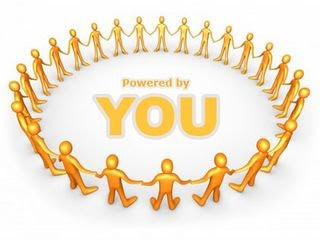I had a brief Twitter conversation awhile back with George Couros (@gcouros) about the complex interaction between people and the technology we create. George commented that he was reading tweet archives from the International Society for Technology in Education 2010 (ISTE10) Conference, and noticed that very few were about technology. Instead, many delegates at the conference commented about the human relationships they initiated or renewed. Interesting considering this conference is a massive education technology event.
My contribution to the conversation ended with the comment... "synergy between people and the technology they use creates ideas, collaboration... possibility otherwise unlikely." I have met many who assert that the use of technology in teaching and learning 'depersonalizes' the experience. I am compelled to disagree. As I grow with technology in my teaching and learning, I am finding that the opposite is true. The tribe I call my
PLN (personal learning network) has grown exponentially since I started using Twitter a short seven months ago. I have had my mind stretched further than ever, including my time in graduate school. My network of passionate educators hails from all over the globe, and I am collaborating with them in ways never before possible without this simple tech tool.
Shortly after I began using Twitter, I started blogging here at KARE Givers. I have always kept a paper journal of reflections and ideas that cross my mind anyway, and I thought blogging would be a good way to collaborate with those who perhaps share my interest in teaching and learning. I had no idea how beneficial this would become, and I've barely gotten started.
My point is rather simple. Adults do well when they understand the power of inter-dependency. We have passed through the stages of dependence and independence in our lives, and hopefully learned that it's infinitely easier to handle the stresses and responsibilities of adulthood when we have others to count on, (and more enjoyable too.) We are social beings; we appreciate the value and benefits of tribes... it's a very basic element of human nature. Micro-blogging (Twitter) and blogging, two relatively simple technologies, have made it incrementally easier for me to connect with my
virtual tribe, and I don't plan on looking back.
Using technology in my professional practise has done the exact opposite of depersonalizing my job; on the contrary, it's brought me closer to other teachers who share my passion for teaching and learning, and allowed me to belong to something so much bigger than myself- a global education reform movement dedicated to the perpetual improvement of the teaching and learning process.
I fail to see any downside to this.









